|
|
|
Sort Order |
|
|
|
Items / Page
|
|
|
|
|
|
|
| Srl | Item |
| 1 |
ID:
158426
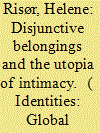

|
|
|
|
|
| Summary/Abstract |
The paper analyses practices of intimacy among youth in a poor, crime-ridden neighbourhood of Santiago. It argues that their sense of belonging to their neighbourhood and broader society is disjunctive: they inhabit the nation-state without complying with expectations of proper citizenship. Similarly, they dwell in their neighbourhood without identifying with it. Instead, they turn to intimate relations with friends and lovers as spaces of belonging. Through these often failing relationships, they pursue emotional and socio-economic stability and seek to fulfil expectations of social becoming and mobility. These intimate and romantic practices can both be understood as an utopian, affective promise that allows for imagining possibilities of a good life and as a moral exercise in the realisation of an adjacent self and we argue that intimacy constitutes a key site in the quest for social belonging among subaltern youth in neoliberal Chile.
|
|
|
|
|
|
|
|
|
|
|
|
|
|
|
|
| 2 |
ID:
158424
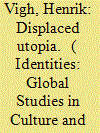

|
|
|
|
|
| Summary/Abstract |
This article looks at the subjectivities of disenfranchised urban men in Bissau, the capital of Guinea-Bissau. Taking its point of departure in an illumination of the ‘thrown’ character of subjectivity, it clarifies the social positions and futures that life in the city is seen to afford. As the city has been caught in a prolonged period of conflict and decline, the retrenchment of the state, economy and social networks has created a setting where people struggle to achieve positive social presence and brighter prospects. The article shows how subjectivities in such situations can become tied to a sense of depreciation and downward mobility. In doing so, it illuminates some of the more common features of social exclusion that affect the urban poor and shows how the processes of decay and deterioration that peoples’ lives are caught in may create a longing for better futures and worthy social emplacement. They spur a striving for socially appreciated being that is imagined as elusively attainable through migration.
|
|
|
|
|
|
|
|
|
|
|
|
|
|
|
|
| 3 |
ID:
158422
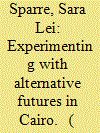

|
|
|
|
|
| Summary/Abstract |
This article investigates young middle-class Egyptians’ engagement with the religious and national visions of Resala, Egypt’s largest Muslim youth NGO, and how they come to rethink themselves existentially and politically through this commitment, in the context of the 2011 uprising and its aftermath. I show how their volunteering through Resala, shaped by specific sociopolitical circumstances, paved the way for personal hopes to develop into utopian aspirations. Demonstrating the dynamic relationship between the formation of political subjectivities and how utopias emerge, develop and are sometimes shattered, I argue that while utopic aspirations continue to characterise parts of Egypt’s 2011 youth generation, for others, such aspirations have to give way for other more personal concerns to establish a secure adult life. Therefore, activism and experiments with societal alternatives in contexts like the Egyptian continue to depend on inclusive and less risky spaces for civic engagement outside formal politics and institutions.
|
|
|
|
|
|
|
|
|
|
|
|
|
|
|
|
| 4 |
ID:
158423
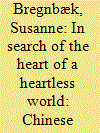

|
|
|
|
|
| Summary/Abstract |
In this article I shed light on the phenomenon of Chinese young people’s conversion to Christianity and argue that it is often closely tied to a utopian longing for what is missing in their lives (Bloch 1907). Through a person-centered account of two young people, I explore their quests to escape the temporal predicament of endless striving 'fuzao' and search for a better life based autotelic values abroad. Paraphrasing Marx I argue that they are in search of ‘the heart of a heartless world’ and argue that they can be seen as individual quests to find hope through more fulfilling forms of human sociality. Arguing that human experience is transitory and illusory in the same way that selves are not stable bounded entities but rather multiple and unstable, I argue that utopia is never fully achieved since it is essentially ‘no-where’.
|
|
|
|
|
|
|
|
|
|
|
|
|
|
|
|
| 5 |
ID:
158420
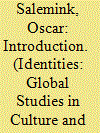

|
|
|
|
|
| Summary/Abstract |
As a fluid age cohort and a social category between childhood and adulthood – and hence with tenuous links to the status quo – youth are variously described as ‘at risk’, as victims of precarious and unpredictable circumstances, or as agents of social change who embody the future. From this future-oriented generational perspective, youth are often mobilised to individually and collectively imagine, enact and embody Utopian futures as alternatives to reigning orders that moulded their subjectivities but simultaneously fail them. The papers in this issue look at how divergent Utopias inspire strategies, whereby young people come together in transient communities to ‘catch’ a fleeting future, cultivate alternative subjectivities and thus assume a sense of minimum control over their life trajectories, if only momentarily. This special issue of Identities explores the individual and collective strategies at play when political and religiously inspired Utopias motivate youth in the Global South to imagine, enact and embody what was missing in the past and present.
|
|
|
|
|
|
|
|
|
|
|
|
|
|
|
|
| 6 |
ID:
158421


|
|
|
|
|
| Summary/Abstract |
This article investigates the changing role of youth in Nepali Maoism following their transformation from a guerrilla army to a parliamentary party after 2006. Drawing on 1 year of ethnographic fieldwork, I trace how the category of youth gained renewed relevance after the war and allowed the Maoist movement to sidestep complicated issues of class in the urban fabric. Building on a Gramscian framework of subaltern politics and Harvey’s ‘dialectical utopianism’, I argue that youth in the post-revolutionary context have become aligned with the political project of building ‘New Nepal’ and that this allows youth, as both a category and a subject position, to emerge as tools for utopian communist politics. Through an analysis of a divided class landscape in Kathmandu, the article documents the new and difficult alignments between Maoist ideals and positions of youth in the city with lasting outcomes for the party’s revolutionary project.
|
|
|
|
|
|
|
|
|
|
|
|
|
|
|
|
| 7 |
ID:
158425


|
|
|
|
|
| Summary/Abstract |
This article is based on a study of the Naturalz crew, a ‘breaking’ or breakdancing group in Quito, Ecuador. Breaking is commonly analysed as a subculture of resistance. We analyse two – often neglected – dimensions of this resistance: the significance of utopian aspirations and the role of the body in subjective transformation. We argue that participants enact utopian values in breaking, for instance by affirming the value of street life and people from the streets. Furthermore, we see that breaking leads to subjective transformation among its young practitioners and that the body plays a central role in this change of subject position. It is interesting that girls use breaking to rebel against dominant images of ideal womanhood, resulting in changes in gendered subjectivity. Hence, from disempowered, marginalised young people, breakers turn into determined agents with physical strength and emotional resilience.
|
|
|
|
|
|
|
|
|
|
|
|
|
|
|
|
|
|
|
|
|